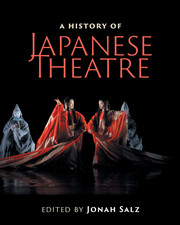Book contents
- Frontmatter
- Contents
- List of figures
- List of tables
- Contributors
- Contributors’ biographies
- Foreword
- Acknowledgments
- Note on Japanese terms
- List of abbreviations
- Timeline
- Editor's introduction
- I Traditional theatres
- Preface to Part I Japanese civilization arises
- II Modern theatres
- Preface to Part II
- III Arcs and patterns
- IV Theatre architecture
- Preface to Part IV Evolution of Japanese theatre architecture
- V Theatre criticism
- 19 Premodern practitioner principles: Zeami to Chikamatsu
- 20 Modern criticism: wrestling with Western realism
- 21 English language scholarship: a critical overview
- Interlude University scholarship and training
- VI Intercultural influences
- Epilogue: Frozen words and mythology
- Further reading
- Index
- References
Interlude University scholarship and training
from V - Theatre criticism
Published online by Cambridge University Press: 05 July 2016
- Frontmatter
- Contents
- List of figures
- List of tables
- Contributors
- Contributors’ biographies
- Foreword
- Acknowledgments
- Note on Japanese terms
- List of abbreviations
- Timeline
- Editor's introduction
- I Traditional theatres
- Preface to Part I Japanese civilization arises
- II Modern theatres
- Preface to Part II
- III Arcs and patterns
- IV Theatre architecture
- Preface to Part IV Evolution of Japanese theatre architecture
- V Theatre criticism
- 19 Premodern practitioner principles: Zeami to Chikamatsu
- 20 Modern criticism: wrestling with Western realism
- 21 English language scholarship: a critical overview
- Interlude University scholarship and training
- VI Intercultural influences
- Epilogue: Frozen words and mythology
- Further reading
- Index
- References
Summary
The state of Japanese academic research may be understood somewhat through examining the major scholarly societies and journals related to Japanese theatre. All established scholarly groups ceased during World War II; present organizations were reestablished in the postwar years.
The all-encompassing Japanese Society for Theatre Research (Nihon Engeki Gakkai, 1949–, www.jstor.org) covers not just Japanese but all the world's stages, in all periods. As of 2014, there were over 630 members. The annual conference solicits papers on a given theme, such as “Takarazuka” (2013) or “Theatre and media” (2011). Theatre Studies: Journal of JSTR is published biannually; there are today also four sub-divisions of the Society. The focus of the Modern Japanese Theatre History Working Group (1975–) is on modern dramatic texts; although they do not publish a journal, they have produced several monographs on Kishida Kunio, Inoue Hisashi, and other prominent figures. The Theatre and Drama in Education Working Group (1985–) examines theatre education from a practical perspective, publishing Research in Drama and Theatre Education annually. The Comparative Theatre Working Group (1988–) explores foreign theatre and interculturalism, publishing the Comparative Theatre Review, in both English and Japanese; it has been available online (www.jstage.jst.go.jp/browse/ctr) since 2012. These groups are based in Tokyo, while the Modern Theatre Working Group (1990–), renamed the Modern and Contemporary Theatre Working Group in 1998, publishes Modern Theatre Studies.
There are individual societies for a number of playwrights, including Yeats, Wilde, Beckett, and Miller, as well as large, active IASIL (Anglo-Irish Literary Society) and Shakespeare associations.
Traditional folk and classical performance genres have several general and genre-based research societies. The Japanese Society for History of Performing Arts Research (1963–) publishes the journal Geinōshi kenkyū (History of the performing arts), and holds annual meetings for both scholars and practitioners. The 2013 meeting featured “Visual documentation of traditional arts,” with contributions from scholars, archivists, and documentary film-makers. There are separate societies for the study of noh, kyogen, and bunraku. The Association for Kabuki (1987–) publishes Kabuki Studies, and the Association for Noh and Kyogen Studies (2002–) publishes Noh and Kyogen. The Japanese branch of the AICT (Association Internationale des Critiques de Theatre)/IATC (International Association of Theatre Critics–Japan, 1981–) publishes Theatre Arts and Kansai region's Act. An annual report, in both Japanese and English versions, is published by the International Theatre Institute/Japan branch Theatre Yearbook: Theatre in Japan (ITI, iti-japan.or.jp).
- Type
- Chapter
- Information
- A History of Japanese Theatre , pp. 480 - 482Publisher: Cambridge University PressPrint publication year: 2016



